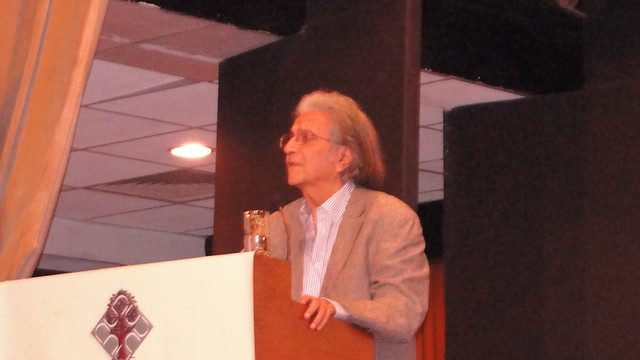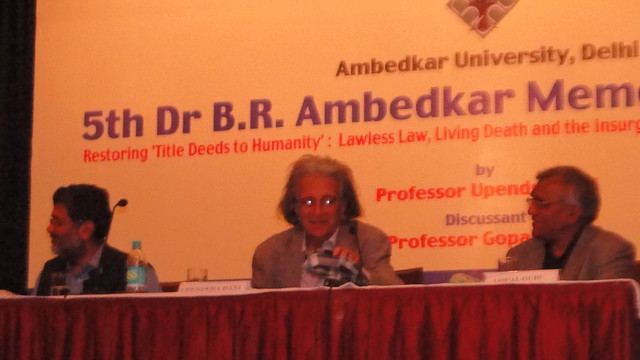By Lalita, TwoCircles.net,
New Delhi: Ambedkar University, Delhi organized the 5th Dr B R Ambedkar Memorial Lecture on 5 March in India Islamic Cultural Centre. The lecture was delivered by Professor Upendra Baxi, eminent legal expert and scholar, on “Restoring ‘Title Deeds to Humanity’: Lawless Law, Living Death and the Insurgent Reason of Babasaheb Ambedkar”.
Professor Baxi, who being an expert in law and jurisprudence, spoke about the need to evolve a “Critical Ambedkar Studies Movement” in education and in field. He highlighted the ‘lawless law’ which could function in any society that leads to exclusions of the kind faced by the untouchables. He quoted the distinction given by Ambedkar between ‘merely living’ and ‘living worthily’ proposing that the notion of human dignity be imbibed to let the dalits thrive in life. Supporting this claim he mentioned the articles 17, 25 of Indian Constitution that make untouchability as an offense and article 35 which empowers only central government to make laws regarding part III of the constitution that has fundamental rights, so that no state could breach these fundamental rights to any citizen.

Professor Upendra Baxi
Ambedkar introduced the concept of ‘demoprudence’ in opposition to jurisprudence, as early as 1936 while Americans coined the term much later. Baxi, praising the 35 volume written works of Ambedkar, spoke of many other scholars and philosophers who had similar views as Ambedkar’s, like John Rawls who’s work on Justice opened the whole debate about social justice, Hannah Arendt who’s work revolves around the oppressed deriving from her own experiences during the holocaust, and Georgio Agamben who has written at length about the genocides calling state as a lethal machine for the marginalized.
Ambedkar renounced the whole of Manu Smriti as lawless law because it made more than half of the humanity untouchable, said baxi. He rather proposed ‘law as discussion’ which hurts some sentiments to make democracy more active and functioning. Untouchability, though, is not foundationless, and this idea formed the life and work of Baba Saheb, concluded Baxi.

Earlier, Vice Chancellor Shyam Menon, of Ambedkar University spoke about the evolution of the Ambedkar Memorial Lecture which began in the year 2009, continuing for consequent years, delivered by prominent scholars in Philosophy, sociology, political psychology etc, like Bhikhu Parekh, Ashish Nandy, Veena Das, and Deepak Nayyar.
Professor Gopal Guru, who is professor of philosophy at Jawaharlal Nehru University, was the discussant. In his assessment of the talk, he said that Baxi takes Ambedkar beyond the confines of the Ambedkar scholarship and opens up the space for a more humanist and inclusive approach. He said that there are loopholes in the formal law which dalits have to face the consequences of, even though the spirit of the constitution as formalized by Babasaheb goes for a ‘dignitarian’ view of the society.
The discretion allowed to the judges and other authorities should be used to favour the marginalized but more often than not the dalits have seen the discretion function against them. We have to look at the post-colonial dalit subjectivity and the notion of power. Guru finally questions “If untouchables become sovereign beings, could they get rid themselves of the power that haunts them?”
